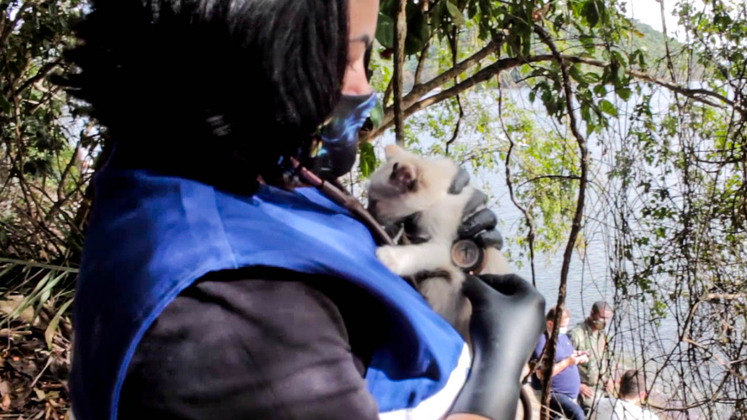The Other Brazilians
 |
| Carl Court/Getty Images |
"They have all they need out there.""There are birds to hunt, and they have other food. There are seeds and insects and snakes they can eat."Miguel Campos, 61, Brazilian boatman, Mangaratiba, Brazil"I couldn't leave the cats out there in such a situation.""I agreed to go the same hour [when she was shown a video from the island; Cat Alcatraz]."Amelia Oliveira, Brazilian veterinarian"It's terrible.""Are we going to let the animals die of hunter, or are we going to keep on giving food, which will only incentivize more abandonment?"Fernanda Porto, environmental sub-secretary, Mangaratiba, Brazil
 |
| Mangaratiba, Brazil |
It is an island, uninhabited but for the cats that have been left there to fend for themselves over the years. The official name for the island is now Ilha Furtada. In popular nomenclature everyone refers to it as Ilha dos Gatos: Island of the Cats. It isn't known how the cats first appeared on the island. In the city of Mangaratiba, close by, officials say a family had attempted to make a life for themselves on the island decades earlier, but abandoned their plans and left behind a pair of cats.
Boatmen have a different story, that there was once a restaurant on the island in a tourist area that closed, with the owners abandoning their cats to the island. It is one small island among many, on a island-hopping-tourism route, though not many have a wish to visit the island. It has no beaches, and large spiders are to be found there. And cats, hundreds and hundreds of cats, though the true numbers are not known. There is no source of fresh water on the island.
Locals had made it a habit to bring food to the cats. Animal lovers have defied the city asking people to stop feeding the cats, that it only encourages further abandonment. There is nothing on the island for the cats to eat. Most have become feral, many have been born on the island, and have no familiarity with humans, but among them are domesticated cats who were once someone's pet, and now roam the island just like the original abandoned cats.
This long-standing problem of abandoned cats prowling a small island with no source of food or water has grown even more problematic over the past two years. Brazil is well known to have suffered greatly from the global pandemic. After India and the United States, it has the largest toll from COVID-19-related deaths. Over 465,000 people have died. With their deaths pets have found themselves without a home. Other Brazilians suffering from the economic downturn finding themselves impoverished without adequate sustenance for themselves, are no longer able to look after their pets.
Not only has Brazil been devastated by the coronavirus, its hospitals reeling from the stress of trying to cope with countless patients seriously ill from the SARS-CoV-2 virus, that other devastation -- of the country's pets left without care and affection and homes become homeless, wandering city streets desperately trying to adapt to scavenging for food and security. Shelters are unable to cope with the influx of abandoned pets.
The shelter located closest to the Island of the Cats has seen people arrive with car loads of cats, too many to take in all at once. When they decline they are informed "If you don't take them, they're going out to Island of the Cats". And this is precisely where they end up. People drop them off on the island or pay a boatman to make the trip, the last stop for unwanted cats who must learn to survive on their own and somehow manage to, aided by the food and water left by visitors. Some die.

Amelia Oliveira, a veterinarian who made it her business to travel around Brazil to care for animals found the island swarming with cats, some of which came toward her purring, and others who were totally feral avoiding her altogether. She has taken some of the friendly cats off the island preparing them for adoption; capturing and neutering others. Her organization has managed in the past ten years, to neuter 380 of the island's cats. "The cat population was being controlled", she said.
Volunteers and groups left food and water, set up small shelters. Local fishermen dropped off part of their catch. And then the pandemic hit and the delicate balance went off kilter as the cats swiftly increased in number. And those who had once fed the cats stopped leaving food and water when restrictions resulting from COVID were brought into law. The nearby city of Mangaratiba found itself with a larger problem needing a solution.
The cat haven was nothing of the kind. It was a cruel solution to people no longer wanting to or able to care for their cats abandoning them to their own devices, live or die. People left jugs on the island to catch rain water. Cat food feeders were left there to be refilled on occasion. And cat-sized 'houses' dotted the island close to the water. Huge spider webs were strung out over everything. When people arrived the cats would congregate awaiting food, then slip back into the forest.
Cat Island remains a problem, a blot on society -- awaiting a solution.
Labels: Abandoned Pets, Brazil, Novel Coronavirus, The Dilemma of Pet Responsibility, The Other Victims

0 Comments:
Post a Comment
<< Home